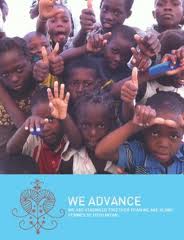About We Advance
Co-founded by activist and actor, Maria Bello, WE ADVANCE is a movement to improve the health, safety, and well-being of women throughout Haiti. WE ADVANCE works in some of the poorest slums in all of the western hemisphere – Wharf Jeremy and Cité Soleil – where security issues deter the work of most international NGOs. We start from the bottom because it’s where we are needed the most and, as co-founder and activist, Barbara Guillaume, says: “If we can change the worst of Haiti we can change all of Haiti.”
* WE ADVANCE models an inclusive grassroots approach with a movement that collaborates with both other organizations and women from every socio-economic class.
* WE ADVANCE is a rights-and community-based participatory program. We empower women’s minds, bodies and spirits and enable them to discover their own needs and priorities, benefiting the entire community.
* WE ADVANCE brings in volunteer experts to train local community leaders in the aspects of health, safety and education.
* WE ADVANCE’s goal is to, in the near future, leave our programs in the hands of Haitian women, the women who know best what they need and how to make it a reality.
My Experience
Of the four We Advance’s co-founders, I spent my time primarly with Cite Soliel Mayoral Candidate and Human Rights Activist Barbara Guilluame, and Executive Director Adele Frishman, Esq. Cite Soliel is a neighborhood of Port Au Prince and is where the Nap Vanse (We Advance) Medical Clinic is located – providing health, education and enrichment services and programs to its target audience. Cite Soliel is known as one of the poorest slums in the Western Hemisphere, along with some of the most notorious gangs.
This first day together Barbara Guilluame and I discussed her 2012 electoral campaign for Mayor and I participated in the project collaboration with Femme en Democratie (FED) attending a couple of their scheduled focus group workshops. Both organizations, FED and We Advance, realized there is no need to re-invent the wheel in its collective universal efforts to provide solutions to the myriad of daunting issues that the Haitian women and their families face daily. Bringing about social change by empowering the women of Haiti to share their voices and consider public leadership is one of We Advance’s top priorities. Although, each organization has their respective strategy to execute in this movement, they work in close alignment. During my visit to the FED office, they were in the process of working to complete their focus group research project of gathering women in regions throughout Haiti. The month long data collection effort will be synthesized in a final report and the findings will be presented to the government at the end of February. Their hope is to acquire additional monies and resources to support and execute the engagement of Haitian women and to amplify their voices in the economic, social and political reconstruction of Haiti.
During the 2010 earthquake there were thousands of women and their families displaced. It is evident that the women who have been the backbone and the caretakers holding together the family structure despite of the horrific circumstances. We Advance has been frustrated by the enormous sums of monies coming into Haiti with no accountability. We Advance wanted to help the Haitian women regain their confidence and dignity with the vision of their participation in the reconstruction of Haiti.
We Advance co-founder, activist and Hollywood actress Maria Bello sits at the table with United States Secretary of State Hilary Clinton and many others in an effort to engage Haitian women in the reconstruction of Haiti. Here is the link to the full briefing: http://www.usip.org/files/resources/PB-119.pdf.
In summary the report published by United States Institute for Peace entitled “HAITIAN WOMEN ARE THE CENTERPOST OF RECONSTRUCTING HAITI” highlights women are Haiti’s ‘poto mitan’ (centerposts), playing pivotal roles in matters of family, education, health, commerce and the economy, and agriculture.
• Gender-based violence has been and continues to be a very real threat to the security and well-being of Haitian women and their families.
• Deficient access to education and healthcare, and misguided agricultural policies, have exacerbated women’s burdens.
• Improved social, economic and political empowerment of women is vital to rebuilding Haiti.
NEXT —- Visit First Three Days in Haiti



No comments yet... Be the first to leave a reply!